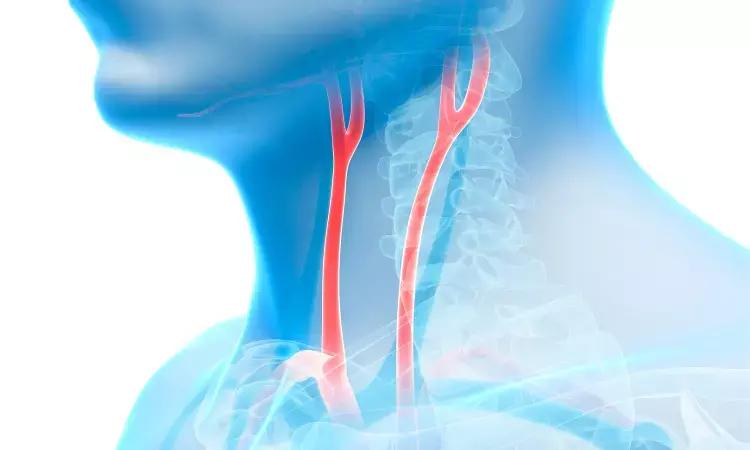Asymptomatic Carotid Stenosis Has Low Stroke Risk, May Not Require Surgery: JAMA
- byDoctor News Daily Team
- 06 August, 2025
- 0 Comments
- 0 Mins

OAKLAND, Calif: The risk of having a future stroke caused by a severe blockage in an artery in the neck that is not currently causing any symptoms is so low that most patients with this condition-asymptomatic carotid stenosis-could potentially be treated with the newest medications and may not require surgery, new Kaiser Permanente research suggests.
"The question of how to best treat patients with narrowing of the carotid artery without symptoms has been a long-standing research priority," said Robert Chang, MD, a physician researcher at the Kaiser Permanente Division of Research and a vascular surgeon with The Permanente Medical Group. "We decided to take a step back and to begin our study by asking how likely is it that these patients will actually have a stroke related to their severe stenosis. Our analyses showed that this risk is so low that it appears that, for most patients, surgery may not be necessary."
The study, published May 24 in JAMA, is believed to be the largest and most current assessment of long-term stroke risk in this population.
Carotid stenosis occurs when plaque-fatty cholesterol deposits-builds up in one or both of the large arteries on either side of the neck that carry blood to the brain, face, and head. This narrowing in the artery is typically diagnosed after a patient has experienced symptoms of a stroke, but it can also be found during a routine physical examination.
Randomized clinical trials conducted prior to 2010 concluded that surgery to remove the blockage was the best option for reducing stroke risk in patients with severe stenosis. But as medical treatments for reducing stroke risk have improved, physicians have begun to wonder whether surgery should remain the preferred treatment for asymptomatic patients.
To answer that question, Dr. Chang and his colleagues identified 3,737 Kaiser Permanente members in Northern California who had been diagnosed between 2008 and 2012 with severe (70% to 99% blockage) asymptomatic carotid stenosis. None of these patients had previously had surgery.
The research team first looked to see how the stenosis had been treated. Reviewing the patients' medical records showed 1,423 patients had had surgery to treat the stenosis, and 2,314 had not. The team also tracked which patients were taking a statin, a drug used to help lower cholesterol in the blood, or medication to reduce high blood pressure. Next, the team looked to see how many patients had a carotid-related stroke on the same side as the severe carotid stenosis, following the patients through 2019.
Overall, 133 strokes were diagnosed in 129 patients during the follow-up period. Statistical analyses showed that the patients who did not have surgery had a 4.7% cumulative risk of having a stroke within 5 years of their carotid stenosis diagnosis.
Disclaimer: This website is designed for healthcare professionals and serves solely for informational purposes.
The content provided should not be interpreted as medical advice, diagnosis, treatment recommendations, prescriptions, or endorsements of specific medical practices. It is not a replacement for professional medical consultation or the expertise of a licensed healthcare provider.
Given the ever-evolving nature of medical science, we strive to keep our information accurate and up to date. However, we do not guarantee the completeness or accuracy of the content.
If you come across any inconsistencies, please reach out to us at
admin@doctornewsdaily.com.
We do not support or endorse medical opinions, treatments, or recommendations that contradict the advice of qualified healthcare professionals.
By using this website, you agree to our
Terms of Use,
Privacy Policy, and
Advertisement Policy.
For further details, please review our
Full Disclaimer.
Tags:
Recent News
Merck Keytruda wins European Commission nod for lo...
- 30 October, 2025
UP NEET 2025 round 3 allotment results postponed
- 30 October, 2025
Achin Gupta to succeed Umang Vohra as Cipla MD, GC...
- 30 October, 2025
Mumbai shocker: KEM Hospital doctor stabbed by col...
- 30 October, 2025
Daily Newsletter
Get all the top stories from Blogs to keep track.


0 Comments
Post a comment
No comments yet. Be the first to comment!